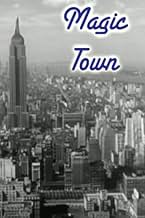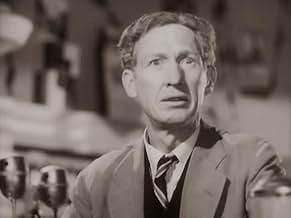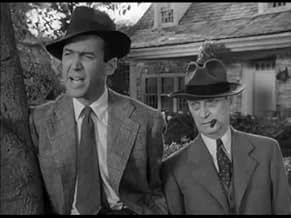CALIFICACIÓN DE IMDb
6.4/10
1.9 k
TU CALIFICACIÓN
Agrega una trama en tu idiomaAn opinion pollster finds a town which is a perfect mirror of U.S. opinions.An opinion pollster finds a town which is a perfect mirror of U.S. opinions.An opinion pollster finds a town which is a perfect mirror of U.S. opinions.
- Dirección
- Guionistas
- Elenco
- Premios
- 1 premio ganado en total
Opiniones destacadas
Maybe the silliest story ever to make it onto the silver screen. James Stewart plays a pollster looking for a town of such mathematical perfection that, whatever you polled its people, it would reflect exactly what the entire nation would feel about a give subject. He finds this place in Grandview, and there he takes his team. When Stewart finds local newspaper editor Jane Wyman trying to convince the town council to build a new civic center, he butts in. If the town were to change at all, its magical polling phenomenon could fade. Similar to The Music Man, Stewart develops a relationship with Wyman to keep the town as it is. Fortunately, it's less cynical and fake than the relationship between the two main characters of The Music Man, and, where Robert Preston's love still seems suspicious by the end of that film, Stewart's feels genuine quickly. He doesn't want the miracle to end, but he is utterly seduced not only by Wyman, but also by the small town. When the town discovers their perfect polling ability, they screw it up pretty much instantly (79% of the population say they would vote for a woman president!). The town goes down the toilet, and it's up to some faithful citizens, joined by the reformed Stewart, to save it. As ridiculous as the initial concept for Magic Town is, it gets even worse near the end. Stewart did this film directly after It's a Wonderful Life, and the small town sentiment is nearly identical in both films. While the first touches me, it's simply schmaltzy in Magic Town. The performances by Stewart and Wyman, as well as many decent supporting performances from many ever-reliable character actors, are better than the movie deserves. Stewart, in particular, is great. I've never seen this guy give a bad performance, and he throws himself behind this awful script with his full soul. He almost got me to buy it. Wyman's beautiful eyes enchanted me. But in the end, the story was just too ludicrous. 6/10.
A year before this film came out there were major news stories about a `perfect American city,' but once the story broke
so did the illusion. People had to learn the perfect society has to be practiced individually, intentionally and daily for it to become a reality.
I just re-watched this film again today and was very entertained by James Stewart (winking and charming) and Jane Wyman (smart and sexy). Packed with the Robert Riskin type characters this story lacks the `real' message of his earlier films and there in lies it's only weakness. It's a fun trip but after we've gone in circles for a while we are reminded there is no place like home. Still this film has lots of treasures in the performances, dialogue, physical comedy and rich diversity home spun Americana characters. I recommend this to all fans of the Capra-Riskin genre.
P.S. It's also your last chance to enjoy the work of Ned Sparks & Donald Meek who both died after completing this minor masterpiece of Riskin-corn.
I just re-watched this film again today and was very entertained by James Stewart (winking and charming) and Jane Wyman (smart and sexy). Packed with the Robert Riskin type characters this story lacks the `real' message of his earlier films and there in lies it's only weakness. It's a fun trip but after we've gone in circles for a while we are reminded there is no place like home. Still this film has lots of treasures in the performances, dialogue, physical comedy and rich diversity home spun Americana characters. I recommend this to all fans of the Capra-Riskin genre.
P.S. It's also your last chance to enjoy the work of Ned Sparks & Donald Meek who both died after completing this minor masterpiece of Riskin-corn.
Stewart's previous movie was "It's a Wonderful Life", and this one drinks from the same well.
It has a strong underlying moral about being true to yourself, and extols the virtues of honesty, pride in your small-town community. The town appears to be a microcosm of America, but it can only be that while it still has its innocence: once it tries to cash in on its status, disaster strikes.
It's a gentle, heartwarming little movie. Jimmy Stewart and the then Mrs Reagan do the romantic lead bits, and lots of people with "interesting" faces play "typical small town characters", the children manage to avoid being ridiculously cute, and it's all quite charming.
Watch out for the Senator's wife and the ancient employees of the newspaper, who are the most obviously funny characters. This may be billed as a comedy, but it's one to be amused by, and brings smiles to you face rather than guffaws and belly-laughs.
If you liked James Stewart in "It's a Wonderful Life" and "The Philadelphia Story", this one's for you.
It has a strong underlying moral about being true to yourself, and extols the virtues of honesty, pride in your small-town community. The town appears to be a microcosm of America, but it can only be that while it still has its innocence: once it tries to cash in on its status, disaster strikes.
It's a gentle, heartwarming little movie. Jimmy Stewart and the then Mrs Reagan do the romantic lead bits, and lots of people with "interesting" faces play "typical small town characters", the children manage to avoid being ridiculously cute, and it's all quite charming.
Watch out for the Senator's wife and the ancient employees of the newspaper, who are the most obviously funny characters. This may be billed as a comedy, but it's one to be amused by, and brings smiles to you face rather than guffaws and belly-laughs.
If you liked James Stewart in "It's a Wonderful Life" and "The Philadelphia Story", this one's for you.
"Magic Town" is a film about something that we nowadays take as normal but which was a novelty in 1947. It was about the new "science" of public opinion polling. This was only understood poorly and not only by the public but by those who actually mattered: the politicians who would grow to need them. In 1936 the Literary Digest, a popular magazine of the day, had conducted a poll of it's membership on who would win the Presidency. It concluded that Governor Alfred Landon of Kansas, a capable man, would beat incumbent President Franklin Roosevelt. Unfortunately the readership of the Digest were upper class, and basically Republican (as Landon was). In November 1936 FDR won one of the biggest landslides in political history, with three quarters of the popular vote and all the electoral votes except for those of Maine and Vermont. Literary Digest went out of business shortly afterwords. In the decade since Roper and Gallup had been improving polling techniques, but the full system was still uncertain. In the 1948 election there would be another polling snafu, with most of the polls awarding the election to Governor Thomas Dewey of New York, as opposed to incumbent President Harry Truman. Harry won a remarkable come-from-behind over Tom, and enjoyed showing off a headline from the Republican "Chicago Tribune" saying that Tom won.
In the midst of all this there was a classic sociology study entitled "Middletown". Set in the typical mid-American town (it was in the Midwest) the authors (a husband and wife team) showed how it's citizens opinions mirrored what mid-America believed. Ten years later the same authors published a follow up study of the town, and it turned there was little change in the opinion differentials between the town and the country.
It is with the "Middletown" study that the background of this film was based. Jimmy Stewart and his assistants (including Ned Sparks and Donald Meek - in his last role) are pollsters, and Stewart has a theory he has been working on that would save pollsters millions. He believes there is a perfect community in the middle of America that can be used for polling it's citizens. He has been studying the problem for several years, and he has found a town where the percentages of the opinions of the citizens perfectly mirror those of the American people as a whole. Stewart goes to the town and sets up there with the intention of using the citizens as his poling guinea pigs, but (as the movie progresses) he gets involved with Jane Wyman and the others in the town. When Wyman discovers Stewart's plans she reveals them, and the town goes crazy. Their sudden unofficial power goes to their heads, and instead of giving the sensible polling answers to questions they give outlandish ones. This causes the crash of their reputation, and the crisis of the film.
It is a first rate film and has some nice touches (including Gabriel Heater intoning on the radio). As an early story regarding the polling industry it is unique, and the film is well acted and directed (by William Wellman). Perhaps not a Capra movie, but it is a nice one all the same.
In the midst of all this there was a classic sociology study entitled "Middletown". Set in the typical mid-American town (it was in the Midwest) the authors (a husband and wife team) showed how it's citizens opinions mirrored what mid-America believed. Ten years later the same authors published a follow up study of the town, and it turned there was little change in the opinion differentials between the town and the country.
It is with the "Middletown" study that the background of this film was based. Jimmy Stewart and his assistants (including Ned Sparks and Donald Meek - in his last role) are pollsters, and Stewart has a theory he has been working on that would save pollsters millions. He believes there is a perfect community in the middle of America that can be used for polling it's citizens. He has been studying the problem for several years, and he has found a town where the percentages of the opinions of the citizens perfectly mirror those of the American people as a whole. Stewart goes to the town and sets up there with the intention of using the citizens as his poling guinea pigs, but (as the movie progresses) he gets involved with Jane Wyman and the others in the town. When Wyman discovers Stewart's plans she reveals them, and the town goes crazy. Their sudden unofficial power goes to their heads, and instead of giving the sensible polling answers to questions they give outlandish ones. This causes the crash of their reputation, and the crisis of the film.
It is a first rate film and has some nice touches (including Gabriel Heater intoning on the radio). As an early story regarding the polling industry it is unique, and the film is well acted and directed (by William Wellman). Perhaps not a Capra movie, but it is a nice one all the same.
James Stewart stars as Rip Smith, a leading pioneer in the new sciences of public polling and demography. He discovers a small town that serves as a microcosm of the US, with the same percentages of men to women, farmers to shop-keepers, Democrats to Republicans, etc. Etc. This means that Rip and his two associates Ike (Ned Sparks) and Mr. Twiddle (Donald Meek) can survey this one town and get the same results as if they's polled the whole nation, saving companies vast amounts of time and money. However, to keep the townsfolk's answers honest, the trio of newcomers pose as insurance salesmen. Rip also falls for local gal Mary (Jane Wyman), but how will she and the others react when they learn the truth of why Rip's in town?
This was made during a time when the new advances in sociology, group psychology, and by extension Madison Avenue's advertising firms, were thought be on the pulse of the future of the nation. This kind of thinking could make for a thoughtful movie with the right script, but this isn't it. This is a traditional rom-com mixed with lukewarm social commentary and square citizenship lessons. Stewart and Wyman are both fine, as usual, and I liked seeing Ned Sparks, one of the busier character actors of the 1930's, acting wry and cynical again. This would be Sparks last film, as it would be for Harry Holman and Donald Meek, too. Director William Wellman keeps things moving quickly enough, but no one would consider this one of the better films by anyone involved.
This was made during a time when the new advances in sociology, group psychology, and by extension Madison Avenue's advertising firms, were thought be on the pulse of the future of the nation. This kind of thinking could make for a thoughtful movie with the right script, but this isn't it. This is a traditional rom-com mixed with lukewarm social commentary and square citizenship lessons. Stewart and Wyman are both fine, as usual, and I liked seeing Ned Sparks, one of the busier character actors of the 1930's, acting wry and cynical again. This would be Sparks last film, as it would be for Harry Holman and Donald Meek, too. Director William Wellman keeps things moving quickly enough, but no one would consider this one of the better films by anyone involved.
¿Sabías que…?
- ErroresAt the soda fountain, between shots, the drinks are full, then half empty, then full again.
- Citas
Mary Peterman: The air becomes charged with electricity around desperate men.
- Versiones alternativasAlso available in a colorized version.
- ConexionesFeatured in Cinéma de minuit: La cité magique (2024)
Selecciones populares
Inicia sesión para calificar y agrega a la lista de videos para obtener recomendaciones personalizadas
- How long is Magic Town?Con tecnología de Alexa
Detalles
- Fecha de lanzamiento
- País de origen
- Idioma
- También se conoce como
- Handen på hjärtat
- Locaciones de filmación
- Productora
- Ver más créditos de la compañía en IMDbPro
- Tiempo de ejecución1 hora 43 minutos
- Color
- Relación de aspecto
- 1.37 : 1
Contribuir a esta página
Sugiere una edición o agrega el contenido que falta





































